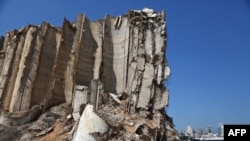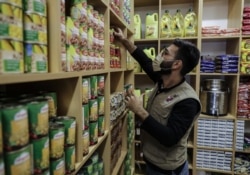The World Food Program says it plans to scale up food and cash assistance for 1.4 million people in Lebanon suffering from the economic effects of last year's Beirut port explosion.
More than 200 people were killed and more than 6,000 injured when thousands of metric tons of ammonium nitrate stored in the port of Lebanon's capital exploded August 4, 2020. The country's economic meltdown following the blast is described as cataclysmic.
The World Food Program reports half of Lebanon's population of 6.7 million people and the entire Syrian refugee population of 1.5 million are living in deep poverty and are short of food.
WFP spokesman Tomson Phiri said the situation is so bad his agency is supporting one in six people in the country, which is more than at any time in its history.
"The impact of the blast, a weakening local currency and the effects of COVID-19 have sent more people into poverty and food insecurity," he said. "Families' purchasing power continues to shrink. And for refugees, food, medicine and rent have become increasingly unaffordable."
Phiri said the price of the WFP food basket, which includes a collection of staple food items, has increased five-fold since the beginning of the crisis in October 2019. That was when the Lebanese cabinet announced new tax hikes to tackle the deteriorating economy, provoking countrywide protests.
"My colleagues in Lebanon tell me that they have seen families lose their homes and jobs with the result that many are now unable to buy enough food for themselves," Phiri said. "In the year since the explosions in Beirut port, the currency has plunged to a fifteenth of its former value, and inflation has put food out of reach for much of the population."
Phiri said WFP requires $100 million to provide food and basic assistance in Lebanon until the end of the year.





